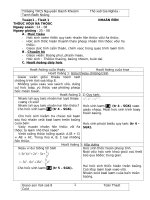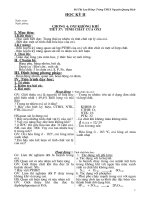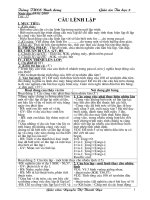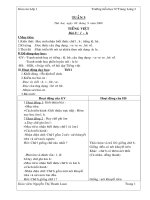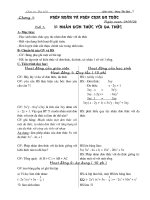- Trang chủ >>
- Luật >>
- Luật thương mại
GA TA 8 T3
Bạn đang xem bản rút gọn của tài liệu. Xem và tải ngay bản đầy đủ của tài liệu tại đây (146.62 KB, 8 trang )
<span class='text_page_counter'>(1)</span>Week: 3 Period: 7. Date of planing:24/8/2014 Date of teaching: UNIT 2: MAKING ARRANGMENTS Lesson 1: getting started, listen and read. I. Objectives: By the end of the lesson, students will be able to - use the telephone to make and confirm arrangements. - Review the simple future tense - Focus on listening, reading and speaking skills II. Teaching aids: Pictures, cassette player III. Procedures: 1. Warm -up teacher’s activities students’ activities Content - ask students to match - match each object a. An answering each object (pictures on (pictures on page 18 with machine. page 18 with its name its name b. A mobile phone c. A fax machine d. A telephone directory e. A public telephone f. An address book 2. Presentation:. - introduce - listen to the teacher As we know, telephone has become more and more popular in our social communication. Thus, it is necessary foe English learners to have good skill of using and understanding the language use in the telephone. In grade 7, we learned how to read telephone number and some other related structures. In this period, we will further study this topic. - play the tape - review the ways to read telephone numbers, the structure to talk with. The way to read telephone numbers: Ex: 3 847 329: three, eight four seven, three two nine Structure: - Can I speak to …?.
<span class='text_page_counter'>(2)</span> some one on the phone and the structure about invitation or suggestion. - take note. - explain some more structures in the dialogue 3. Practice: - play the tape - have students role play - play the again and have students do exercise 2 in the book page 19. - have students exchange and compare the answers with classmates - have students read the answers in front of class and others give comments. - give correct answers.. - Would you like …? - Let’s … - She is downstairs >< upstairs - It’s a bit far from my house (noù caùch nhaø toâi khaù xa). - listen to the tape - role play - do exercise 2 in the book page 19 - exchange and compare the answers with classmates. - read the answers in front of class and others give comments Answers: - copy in the answer in a. Nga make the call the book. b. Nga introduced herself c. Nga invited Hoa to the movies d. Nga arranged a meeting place - have students ask and e. Nga agree the time answer the questions and answers in pairs - work in pairs. 4. Consolidation:. - remind the way to read the telephone numbers, structures to talk with someone on the phone, structure about invitation or suggestion - Make sample conversation 5. Home work: - Ask students to prepare the lesson for the next period. - take notes. - Pairwork. - Listen and follow teacher’s instruction. - Prepare Unit 2: Speak and listen. -------------------------------------------- o0o ---------------------------------------------.
<span class='text_page_counter'>(3)</span> Week: 3 Period: 8. Date of planing:24/8/2014 Date of teaching: UNIT 2: MAKING ARRANGEMENTS Lesson 2: Speak, Listen. I. Objectives: - By the end of lesson, students will be able to talk on the telephone about intentions with GOING TO. - Review the Simple Future Tense - Focus on Listening, Speaking and writing skills II. Teaching aids: Extra board, chart III. Procedures: 1. Warm -up. teacher’s activities students’ activities Content - talk to students about - listen to the teacher and - Do you have a telephone using telephone and ask answer the question as at home? them questions teacher’s ask - How often do you make a phone call? - What would you say when you pick up the phone to answer it? - What would you say if you are the caller? 2. Pre - Speaking:. - ask students to do exercise 1 on page 20 - have students to work in pairs to put the sentences in the correct order to make a complete conversation - call some pairs to read the dialogue that is arranged - give the correct answer. - do exercise 1 on page 20. Answers: 1-b: Hello. 9210752 - work in pairs to 2-f: Hello. Can I speak to Eric, please? put the sentences 3-j: Hello. Adam. How are you? in the correct 4-a: I’m fine. I’m going to the pop order to make a concert complete at the city Concert Center tonight. conversation Would you like to come? - read the 5-i: Which band is it? dialogue that is 6-c: It’s Kids in Town. You like it, arranged don’t - take notes you? 7-e: Yes. What time can we meet? 8-k: Is 7.15 OK? The concert starts at 7.45. let’s meet inside the center, at the cafe corner 9-g: That’s fine. See you at 7.15. Thank you Adam..
<span class='text_page_counter'>(4)</span> - ask students questions. - explain “Be going to”. - answer - take notes. Questions: - What do they intend to do? (they intend to go to the pop concert) - What time are they meeting? Where? (They are meeting inside the center at 7.15) Form: S + be + going to + infinitive. 3. While - speaking:. - have student look at part 2 page 20 - elicit Ba calls Bao to invite him playing chess and they are arranging the suitable time you find out Bao’s sentences to complete sentences - call some pairs to read the complete dialogue in front of class. - give feed back. - look at part 2 page 20. Ba: Hello. 8257021 - read the complete Bao: May I speak to Ba, please. dialogue in front of This class. is Bao. - take note Ba: Hello, Bao. How are you? Bao: I’m fine thanks. And you? Ba: Great me too. Bao: Can you play chess tonight? Ba: I’m sorry. I can’t play chess tonight. I’m going to do my homework. Bao: What about tomorrow afternoon? Ba: Tomorrow afternoon is fine. Bao: I’ll meet you at Central Chess Club. Ba: At Central Chess Club? Ok. Let meet at the front door. Bao: Is 2.00 o’clock OK? Ba: Great. See you tomorrow afternoon at 2.00 o’clock.. 4. Post - speaking:. - have students work in - work in pairs practice pairs practice the dialogue the dialogue in part 1 and.
<span class='text_page_counter'>(5)</span> in part 1 and part 2 part 2 - Make an arrangement on the telephone 2. Listen: 2.1. Pre-listening:. - Introduce the situation of - Listen to the teacher. conversation. - Ask students to read the - Read the message. message. 2.2. Whlie-Listening:. - Listen to the telephone conversation. Fill in the missing information.. - Listen to the tape and fill.. 1. Listen to the phone conversation. Fill in the missing information. Date ( Ngµy nhËn tin) Time ( giê nhËn tin) For (göi cho) Message: Mrs Mary Nguyen wanted to see you at 9. 45 in the morning. Telephone number: 64 683 720 942. 2.3. Post-Listening:. - Call some students read the answers. - Give answer keys. 3. Home work: - Ask students to prepare the lesson for the next period. - Some students read their answers. - Check and correct.. - Listen and follow teacher’s instruction. - Learn by heart the new words. - Make an arrangement to play soccer with your friend. - Do exercise 2/ 14. - Prepare read. -------------------------------------------- o0o --------------------------------------------Week: 3 Period:9. Date of planing:24/8/2014 Date of teaching: UNIT 2: MAKING ARRENGAMENTS Lesson 4: Read.
<span class='text_page_counter'>(6)</span> I. Objectives: - By the end of the lesson, students will be able to know more about Alexander Graham Bell - Review simple past tense - Focus on reading and listening skills II. Teaching aids:demonstrate Picture, cassette player III. Procedures: 1. Pre - reading:. Teacher’s activities - ask students questions. students’ activities - answer.. Content Questions: Who is in the picture? What do you know about him? What did he invent? When? - Alexander Graham Bell. - He is an inventor. - He invented. The telephone in 1876.. - elicit When we talk about - discuss and Alexander Graham Bell answer what words about this man appear in your mind? - cop in the book New words: - explain some newwords - emigrate (v): di cö - deaf-mute (n): người vừa câm, ñieác - experiment (n): cuoäc thí nghieäm - transmit (v): truyeàn tín hieäu - invent (v): - invention (n): - have students read the - conduct (n): haïnh kieåm new words twice - demonstrate (v): chứng minh, giải - introduce the lesson We are going to read thích about of the greeted - device (n): phöông saùch scientists in the world, the - countless (a) : voâ soá inventor of the telephone. - exhibition (n): tröng baøy Alexander Graham Bell - commercial (a) : thuoäc veà thöông maïi 2. While - reading:. - have students read the - read the passage passage one and answer one and answer the.
<span class='text_page_counter'>(7)</span> the questions. - have students compare the answers with a friend - ask students why the answer is false or true. - give the correct answers.. questions. compare the answers with a friend - copy in the book.. - continue eliciting. Now you read the passage again and put the event in correct order - have students work in pairs do the exercise 2 - have some pairs read the answers the others listen, give comments and correct - give correct answers. 1. a. F. he was born in Edinburgh Scotland. b. F. He worked with deafmutes at Boston University c. T d. F. Bell and Watson introduced the telephone in 1876 e. Bell experimented with way of transmitting speech over a long distance. - listen to the teacher. - work in pairs do the exercise 2 - read the answers the others listen give comments and 2. correct. Alexander Graham Bell: - copy in the book. d. was born in Scotland e. went to live in Canada. a. went to live in the United State g. worked with people neither speak nor hear c. worked with Thomas Watson b. successfully demonstrated his invention f. invented the telephone.. 3. Post - reading:. - have students read the passage in front of class. - have students work in groups 4 or 5 and summarise about Alexander Graham Bell. - read the passage in front of class. - say something about Alexander Graham Bell (base on events in exercise 2).
<span class='text_page_counter'>(8)</span> 4. Home work: - Ask students to prepare the lesson for the next period. - Listen and follow teacher’s instruction. Unit 2: Write. -------------------------------------------- o0o ---------------------------------------------IV. Feed back: ---------------------------------------------------------------------------------------------------------------------------------------------------------------------------------------. COMMENT ---------------------------------------------------------------------------------------------------------------------------------------------------------------------------. SIGNATURE.
<span class='text_page_counter'>(9)</span>

